Related Research Articles
"Little Wing" is a song written by Jimi Hendrix and recorded by the Jimi Hendrix Experience in 1967. It is a slower tempo, rhythm and blues-inspired ballad featuring Hendrix's vocal and guitar with recording studio effects accompanied by bass, drums, and glockenspiel. Lyrically, it is one of several of his songs that reference an idealized feminine or guardian angel-like figure. At about two and a half minutes in length, it is one of his most concise and melodically focused pieces.

Band of Gypsys is a live album by Jimi Hendrix and the first without his original group, the Jimi Hendrix Experience. It was recorded on January 1, 1970, at the Fillmore East in New York City with Billy Cox on bass and Buddy Miles on drums, frequently referred to as the Band of Gypsys. The album mixes funk and rhythm and blues elements with hard rock and jamming, an approach which later became the basis of funk rock. It contains previously unreleased songs and was the last full-length Hendrix album released before his death.

First Rays of the New Rising Sun is a compilation album credited to American rock musician Jimi Hendrix, issued in 1997 on MCA Records. Featuring songs mostly intended for his planned fourth studio album, it was one of the first releases overseen by Experience Hendrix, the family company that took over management of his recording legacy. It reached the album charts in the United States, United Kingdom, and four other countries.
"Voodoo Chile" is a song written by Jimi Hendrix and recorded in 1968 for the third Jimi Hendrix Experience album Electric Ladyland. It is based on the Muddy Waters blues song "Rollin' Stone", but with original lyrics and music. At 15 minutes, it is Hendrix's longest studio recording and features additional musicians in what has been described as a studio jam.
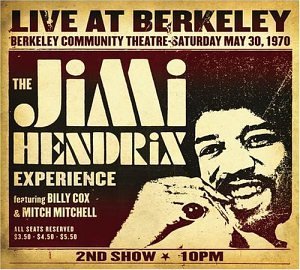
Live at Berkeley is a live album by American rock musician Jimi Hendrix. It documents his second performance at the Berkeley Community Theatre on May 30, 1970, and was released by MCA Records on September 16, 2003.
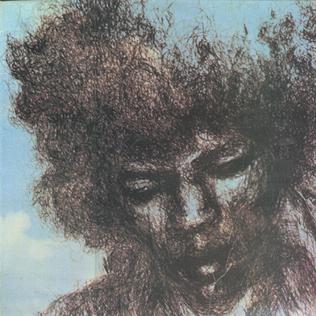
The Cry of Love is a posthumous album by Jimi Hendrix. It includes new material that he was working on for his planned fourth studio album. While most of the songs were included on proposed track listings by Hendrix, the final selection was made by recording engineer Eddie Kramer and drummer Mitch Mitchell, with input from manager Michael Jeffery. Hendrix, Kramer, and Mitchell are credited as the producers, with Jeffery as the executive producer.

"Angel" is a song by American rock musician Jimi Hendrix, featured on his 1971 posthumous studio album The Cry of Love. Written and self-produced by Hendrix, he recorded it for his planned fourth studio album just months before he died in September 1970.
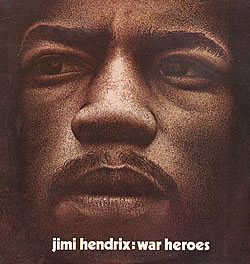
War Heroes is a compilation album by American guitarist Jimi Hendrix. Released in the UK on October 1, 1972, and in December 1972 in the US, it was the third album of mostly unreleased studio recordings to be issued after Hendrix's death. The album was engineered, mixed and compiled by Eddie Kramer and John Jansen, although biographer and later Hendrix producer John McDermott also identifies Hendrix as a producer.

Jimi Hendrix (1942–1970) was an American guitarist and singer-songwriter whose career spanned from 1962 to 1970. His discography includes the recordings released during his lifetime. Prior to his rise to fame, he recorded 24 singles as a backing guitarist with American R&B artists, such as the Isley Brothers and Little Richard. Beginning in late 1966, he recorded three best-selling studio albums and 13 singles with the Jimi Hendrix Experience. An Experience compilation album and half of a live album recorded at the Monterey Pop Festival were also issued prior to his death. After the breakup of the Experience in mid-1969, songs from his live performances were included on the Woodstock: Music from the Original Soundtrack and More and Band of Gypsys albums. A studio single with the Band of Gypsys was also released.
"Have You Ever Been " is a song by English-American rock band the Jimi Hendrix Experience, featured on their 1968 third album Electric Ladyland. Written and produced by frontman Jimi Hendrix, the song acts as the title track of the album, as well as essentially the opening track following the short instrumental intro "...And the Gods Made Love".

Voodoo Soup is a posthumous compilation album by American rock musician Jimi Hendrix, released in the United States on April 11, 1995, by MCA Records. It was one of the last Hendrix albums produced by Alan Douglas, who was also responsible for the posthumous Hendrix releases Midnight Lightning and Crash Landing in 1975.

Rainbow Bridge is a compilation album by American rock musician Jimi Hendrix. It was the second posthumous album release by his official record company and is mostly composed of recordings Hendrix made in 1969 and 1970 after the breakup of the Jimi Hendrix Experience. Despite the cover photo and subtitle Original Motion Picture Sound Track, it does not contain any songs recorded during his concert appearance for the 1971 film Rainbow Bridge.
"Stepping Stone" is a song by American musician Jimi Hendrix. Written and produced by Hendrix, he recorded it early in 1970 with the short-lived Band of Gypsys lineup of Hendrix, Billy Cox and Buddy Miles. The song, with "Izabella", was released as a single by Reprise Records on April 8, 1970. It was the last single released by Hendrix before his death. Other versions are included on posthumous albums.
The Cry of Love Tour was a 1970 concert tour by American rock guitarist and singer Jimi Hendrix. It began on April 25, 1970, at the Forum in Inglewood, California, and ended on September 6, 1970, at the Love & Peace Festival in Fehmarn, Germany. The majority of the 37 shows were in the United States, with two each in Sweden, Denmark, and Germany, and one in England, where Hendrix was the final act at the Isle of Wight Festival 1970.
"Ezy Ryder" is a funk rock-style song written and recorded by American musician Jimi Hendrix. It is one of the few studio recordings to include both Buddy Miles on drums and Billy Cox on bass, with whom Hendrix recorded the live Band of Gypsys album (1970).
Jimi Hendrix intended to release his fourth studio album as a double or triple LP before Christmas 1970. From June to August 1970, he made good progress on the realization of the planned album in his new Electric Lady Studios. Many songs were mixed on 20, 22 and 24 August. Four of these mixes were regarded as definitive versions and were presented at the opening party of Electric Lady on 26 August. Hendrix died on 18 September, leaving behind an enormous number of unreleased recordings in various stages of completion. It is impossible to know what Hendrix would have changed and what he actually would have released, but there is some documentation of the album configurations he had in mind. While a good part of the designated tracks only needed some finishing touches, others only existed as rough recordings and for some titles no recordings are known at all. The Cry of Love (1971), Voodoo Soup (1995) and First Rays of the New Rising Sun (1997) are officially released attempts to reconstruct the planned album. First Rays of the New Rising Sun is usually regarded as closest to Hendrix's vision, but features a track that was probably never part of Hendrix's plans and omits some tracks that were definitely considered. All but one of the tracks that are known to have been recorded for the album have eventually been released in some shape or other on official albums.
"Hey Baby " or simply "Hey Baby" is a song written and recorded by American musician Jimi Hendrix, from his second posthumous album Rainbow Bridge (1971). The song is a slower and more melodic piece, which features the prominent use of chorus- and tremolo-effects on guitar. Hendrix uses an idealized feminine figure that recurs in several of his lyrics. Commentators have seen the song as representative of his post-Band of Gypsys musical direction.
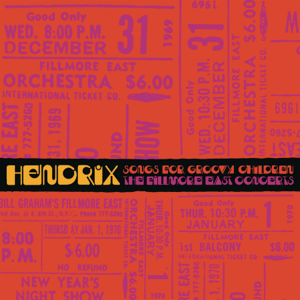
Songs For Groovy Children: The Fillmore East Concerts is a chronologically sequenced collection of American musician Jimi Hendrix's 1969–1970 New Years recorded performances at the Fillmore East in New York City. It was released as a box set of five-CDs on November 22, 2019 and an eight-LP set on December 13.
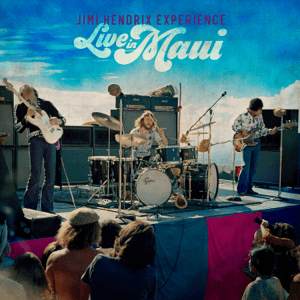
Live in Maui is an album by the Jimi Hendrix Experience documenting their performance outdoors on Maui, Hawaii, on July 30, 1970. It marks the first official release of Hendrix's two full sets recorded during the filming of Rainbow Bridge (1971). The two-CD and three-LP set was released on November 20, 2020, along with a video documentary titled Music, Money, Madness ... Jimi Hendrix in Maui.
References
- 1 2 3 4 5 Greenwald, Matthew. "Jimi Hendrix: 'Night Bird Flying' – Review". AllMusic . Retrieved April 5, 2018.
- ↑ Murray, Charles Shaar (1991). Crosstown Traffic (1st. U.S. paperback ed.). New York City: St. Martin's Press. pp. 74–76. ISBN 0-312-06324-5.
- ↑ McDermott, John; Kramer, Eddie; Cox, Billy (2009). Ultimate Hendrix. San Francisco: Backbeat Books. p. 243. ISBN 978-0-87930-938-1.
- ↑ McDermott, John; Cox, Billy; Kramer, Eddie (1995). Jimi Hendrix: Sessions. New York City: Little, Brown. ISBN 0-316-55549-5.
- ↑ Shapiro, Harry; Glebbeek, Cesar (1990). Jimi Hendrix: Electric Gypsy. New York City: St. Martin's Press. p. 539. ISBN 0-312-05861-6.